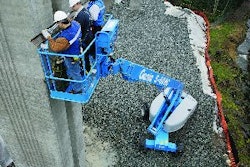There are six systems that control the fate of your construction business. Those are:
1. Marketing
2. Sales
3. Staffing
4. Planning
5. Tracking
6. Financial Control
There are also ten components that should come together to form your sales system.
Do you remember that the sole purpose of your selling system is to land negotiated work? In other words, to close deals and ring the cash register.
Getting to participate in a lowest-price-wins bid does not require salesmanship nor does it amount to selling.
In the construction industry, selling is defined by being hired, or in other words, landing negotiated work. You need 10 systems for landing enough negotiated work to grow your company profitably.
1. Assigning and Prioritizing Leads
If your marketing system is doing its job, you should be receiving a flood of leads. You need to create criteria for sorting and prioritizing those leads.
The best way to do that is to identify and communicate the profile of you're "A", "B", and "C" level prospects. Know the characteristics that your best customers share.
Your "A" prospects are the ones who are looking for the benefits that you excel at and can prove it with case histories and testimonials.
Your "B" prospects are the ones you often are a good fit for, but not always.
Your "C" prospects are the ones your competition is a better fit for.
Whoever is assigned the responsibility of sorting through the leads must be given clear criteria for assigning "A", "B", and "C" grades.
2. Qualifying Leads.
You don't have time to waste on "C" prospects, "B" prospects who aren't a good fit, nor "A" prospects who are married to your competition.
When you call on your prospect, get right to the heart of the matter. Tell them that as valuable as their time is to them, your time is to you. If they are willing to answer a couple of questions honestly, it may save both of you considerable time. Test their fit to the quality and style of the service you provide.
If they aren't going to value your services sufficiently, politely inform then you are not interested in their work and be on your way.
3. Following Up With Prospects.
Marketing research shows that vast majority of customers buy after the seventh contact. What's that mean to you? You had better plan on following up several times with your prospects.
Here's another piece of relevant selling information:
You will slip from your prospect's awareness after 21 days. If they don't hear from you for 21 days, your chances for a sale diminish greatly. Because buying is an impulsive act, timing is everything.
You need a follow-up system that lets you get back to your prospects quickly and stay in close contact with them until their decision is made.
4. Creating Proposals and Presentations.
You need standard templates for your proposals and presentations. The templates will allow you or someone who works for you to quickly pull together a professional, persuasive proposal and presentation.
If some combination of text, financial figures, and pictures are needed, make sure everyone who is involved understands their role.
Test your proposal design until you find one that consistently moves the client to the decision you seek.
5. Processing Orders.
Your staff needs to understand exactly how orders are to be processed. Information must reach the scheduler, the operations person who arranges for material purchases, and the accounting staff. The paper trail must be well defined and adhered to.
The filing system should be well organized and centralized. Once the sale is closed, the order processing must go smoothly to ensure a successful project and a happy customer.
6. Following Up With Customers After Their Project is Finished.
Follow up with every customer within two days of finishing. Make sure the customer is satisfied with the work and will not hesitate to pay the bill.
If the customer is displeased, address the situation head on and try to rectify the problem quickly.
Send a thank you card. If the project was high value, include a gift certificate to dinner or a donation to their favorite charity in their name.
7. Motivating the Pursuit and Procurement of Profitable Sales.
Implement a sales compensation plan that rewards salesmen for selling profitable work. Make sure the system rewards all salesmen equally for identical performance. Keep the sales team focused on high profit work.
Any competent estimator can land low profit work. If salesmen are going to earn their keep, they must close on a bundle of highly profitable work.
8. Improving the Salesmen's Selling Skills.
Virtually nobody in the construction arena can afford to hire a proven rainmaker. You must learn how to grow your own.
That means you need to coach your salesmen. If they develop beyond YOUR ability to help them, hire a sales coach.
Few things will bring money into your company faster than a highly skilled and motivated salesman.
9. Networking.
It's not who you know but who knows you.
Your network is your early warning system for new opportunities. The better your team is networked, the greater the likelihood your company will be the first to learn about a lead.
Networks take time to build and nurture. You must stay in constant contact with your network to keep yourself at the forefront of their minds. You need to send business their way.
Networks work best when each member is helping the others succeed.
10. Strengthening Customer Relationships.
You need a system for strengthening your relationship with your newer customers. Your goal is to become an invaluable resource to their personal success.
You can do this by helping them solve problems you have expertise in. You can do this by providing budget information for work they should or may undertake. You can do this by passing along contact information of individuals who will help them get ahead.
The assistance you provide need not be limited to their professional interests. If you discover they are passionate about a hobby, forward hard-to-find information that might be of interest to them.
Of course, the tried and true method is to take them out to lunch or dinner or take them to some type of event. The value of the customer determines the amount of time and money you should invest in the relationship.
Regardless of how you do it, you must stay close to your most valuable customers.
Final Note
You probably noticed that closing the sale is not listed as among the 10 selling systems. Closing is a skill, a very valuable skill. You that someone in your company must have.


















